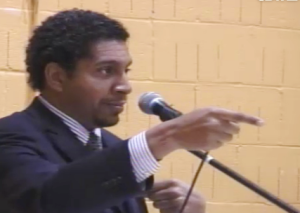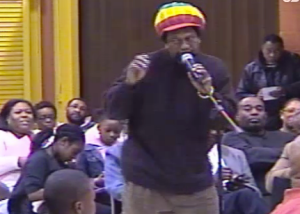“We say in our [National] Anthem, we vow to keep our country ever free. And that vow brings with it certain responsibilities …” — Ambassador Camillo Gonsalves.

KINGSTOWN, St. Vincent — St. Vincent and the Grenadines (SVG) Permanent Representative to the United Nations, Camillo Gonsalves has defended himself against criticisms that his March 28 arrest by a cop in New York could have been avoided had he acted differently.
A New York Police Department (NYPD) officer forcibly handcuffed Gonsalves in the lobby of the building where the SVG U.N. Mission is located in New York. The cop later cited “disorderly conduct”.
The diplomat had stepped between barriers outside the building – something, he said, he and other building occupants have done for years.
“People with the benefit of hindsight, who want to break things down second by second, could always say this or that or the other could have been done. But, … imagine it happening,” Gonsalves said last week at a town hall meeting to discuss the incident with Vincentian diasporans in New York.
“I think even if it happened again, with the benefit of hindsight, I think I would have done the same thing. Because, the other option would be to come off as a small aleck or smug or arrogant in some sort of way and I don’t think the officer deserves that sort of response,” he said in answer to a question from the floor.
Gonsalves said that a cop on duty outside the building asked him rudely what he thought the barricades are for.
He said he could have told the cop that the barricades were for demonstration but none was taking place outside the building that day, and in so doing sound like a smart aleck.
“Or, I could ignore what was an arrogant and ignorant comment and continue on my way into my office. The third option is to say, ‘Sorry sah! I am very sorry for walking across your precious barricades, sir.’ And that response, in my humble opinion, is not the sort of response that is appropriate in those sort of circumstances,” he said to applause.
Calm in ‘cuffs
Gonsalves said that even when he was under arrested and in handcuff — a contravention of the Vienna Convention of Diplomatic Relations (VCDR) — he was calming diplomatic and other personnel who were suggesting actions that could have caused the situation to escalate.
Opposition Leader Arnhim Eustace said six days after the arrest that both Gonsalves and the cop should have acted differently.
He said that the diplomat should have shown his identification card to the lawman when asked and that the cop acted “disproportionally” and “inappropriately” when he grabbed the Vincentian envoy by the neck and shoulder.
Gonsalves did not refer specifically to Eustace’s comments — which outlined the position of the opposition New Democratic Party — when he recounted the incident last week.
He, however, said that he could not submit himself to arrest and set precedence for New York cops to disregard the inviolability of diplomatic missions and personnel.
He reminded the Vincentian diasporans of their national anthem.
“We say in our Anthem, we vow to keep our country ever free. And that vow brings with it certain responsibilities and when we have rights in international law, in human rights law, in any law, … those rights must be vigorously protected and defended or they will go away.”
He said that as a diplomat who has “spoken tirelessly at the United Nations about the need to maintain international law and the need to respect the rights of everyone, and the need for the large powers to respect the sovereignty and independence of the small powers, it is incumbent on me and the government of St. Vincent and the Grenadines to fully defend the rights of St. Vincent and the Grenadines, its sovereignty, … and that’s what we intend to do.”
Gonsalves quoted the VCDR, which says that diplomatic personnel should not be arrested or detained. “I knew I had committed no crime [and] that I could not subject myself, as a representative of St. Vincent and the Grenadines, meekly to arrest.
“So I told the gentleman (cop) I will not place my hands behind my back (to be handcuffed). I didn’t fight; I simply said I would not place my hands behind my back,” he said.
“I was very calm and, in fact, I was spending my time in handcuffs calming down the crowd that had gathered. Because some of them were suggested all short of activity that I didn’t want to make the situation degenerate into something more heated,” Gonsalves further stated.
He also explained his refusal of a U.S. State Department official’s request for the cop to go to the SVG Mission and shake hands with him over the incident.
“I said very respectfully again, this is the inviolable premises of St. Vincent and the Grenadines. I do not want to set a precedent where the members of the New York Police Department feel they can [walk] in and out of the inviolable premises of St. Vincent and the Grenadines,” he said to applause.
He further said that since his arrest had been communicated to the Unity Labour Party government in Kingstown — which his father, Prime Minister Dr. Ralph Gonsalves, heads — he “didn’t want the cop to shake his hand and think the matter had been put to bed”.
The diplomat said he was injured in the incident but health care professionals at a New York hospital told him that the numbness in his left hand should dissipate with time.
“As we speak here today, if you prick me with a pin, I can’t feel it. So I am numb between my thumb and my … index finger on my left hand and I still do not have a full range of motion in this hand,” he said last week — two weeks after the incident.
Importance of diplomatic immunity
Gonsalves, a lawyer who has been a diplomat since September 2007, said that diplomatic immunity is not intended to make diplomats feel that they are above the law but is inevitable for international relations.
“… if diplomats were afraid that if they went to country X or country Y to carry a message they could be arrested, or detained, or beaten, or tortured, then nobody would go. … It’s that simple,” he said.
“… [Diplomats] have to know that countries would not trump up charges to lock them up,” he said, adding that while some countries do not have “very strong tradition of human rights and the rule of law”, every nation honours the VCDR.
Gonsalves, however, noted that “sometimes, diplomatic immunity has been abused”. He mentioned a 1979 incident in which a Burma (now Myanmar) ambassador in Sri Lanka shot his wife and cremated her on a pyre in his backyard.
The cremation took place while police stood outside of the house of the ambassador, who had reminded them that his house was Burmese territory.
Gonsalves also spoke of the case in Pakistan last year where that country’s law enforcement officials arrested an American who had shot two Pakistani in a marketplace. The U.S. government said that the American works at the embassy and that he has diplomatic immunity.
“… I am not talking about walking through a barricade here, you know. Russian diplomats have run over people with their cars and the only punishment is that they go back home; but not that they are arrested,” Gonsalves said.
“… the concept of diplomatic immunity is so important that even when it is abused, they continue to respect diplomatic immunity,” he further stated, adding that African diplomats, also, were not arrested when they were accused of child abuse.

He said that as part of the concept of diplomatic immunity, states “trust each other to send respectable people. … that the people who come would comport themselves in a manner reflecting their country and the dignity of their country.
“And I would like to think that in the four and a half year that I have been here that I have done my … best to reflect the dignity, the freedom and the pride of St. Vincent and the Grenadines in everything that I do,” he said.
Turned tables
But while some Vincentians — at home and in the diaspora — have faulted Gonsalves for the incident, he spoke of the potential response if a foreign diplomat were arrested in SVG.
“I would hate to think what would happen if an American ambassador travelling in St. Vincent and the Grenadines … is arrested and placed in handcuffs and detained for some period of time …, has numbness in their hand. I would hate to hear what people would be saying both in America and St. Vincent if something like that were to take place,” Gonsalves further said.
Responding to a comment about how the cop would have know that he was an ambassador, the Vincentian envoy said to applause: “Jails are full of people who didn’t know the girl was under 18,” a reference to a minor’s legal ability to consent to sexual activity.
“There are some things that it is your responsibility to know before you act,” he said.
“Now, you are guarding a diplomatic premises. A diplomatic vehicle bearing diplomatic plates pulls up directly in front of you. Out of the diplomatic vehicle bearing diplomatic plates in front a diplomatic mission steps what?” he said to cheers and applause, as he emphasised “diplomatic”.
“If it walks like a duck and its quacks like a duck, it is probably a duck!” said Gonsalves, who told the audience that among the persons who has sent him messages of support was Louise Mitchell-Joseph, daughter of former prime minister and NDP founder Sir James Mitchell.
The government here has said that it has not ruled out legal redress even as it seeks to have the matter resolved through diplomatic means.
Prime Minister Gonsalves had said that he would have sort an audience with either U.S. President Barack Obama or Secretary of State Hillary Clinton on the side lines of the two-day Summit of the Americas meetings in Columbia, which ended Sunday.





